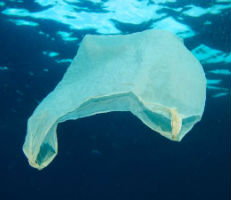 The best way to combat plastic pollution in the oceans is to stop the plastic before it gets there.
The best way to combat plastic pollution in the oceans is to stop the plastic before it gets there.
We have been posting about the ever-growing garbage patches in the world’s oceans for the better part of a decade. The posts are beginning to have a certain sameness. Things are getting worse. The garbage patches trapped in the ocean gyres are getting growing larger. Six years ago, the Eastern Pacific Garbage Patch was a wide as the Continental United States. Whales are dying from ingesting plastic. Record levels of microplastics are being found in Arctic ice. A popular dive spot near Bali is turned into a “sea of trash” by plastic bags. And on and on and on.
There have been efforts to clean up the plastic that is already in the ocean, plans which often look better on paper than in practice. The truth is that removing “downstream” plastic, plastic already in the ocean, is the most costly and least efficient way to approach the problem.
Single-use plastic bags are a significant part of the problem. The Earth Policy Institute estimates that, worldwide, a trillion single-use plastic bags are used each year, or nearly 2 million each minute. The environmental impact of these non-biodegradable bags when they reach the oceans is massive.
Plastic bags also require considerable fossil fuel to produce. An estimated 12 million barrels of oil are required to manufacture the 100 billion plastic bags used in the United States alone.
Why aren’t people and nations attempting to prevent the stream of plastic from making its way into the oceans in the first place? The good news is that, perhaps belatedly, in nations around the globe, they are.
In April, the British government announced that single-use plastic products such as straws, drink stirrers and cotton buds, will be banned from being sold in the country. (Single-use plastic bags had been taxed in the UK since 2015.) Prime Minister Theresa May used the Commonwealth Heads of Government summit in London as a launchpad for the initiative.
Prime Minister May said “plastic waste is one of the greatest environmental challenges facing the world, which is why protecting the marine environment is central to our agenda at the Commonwealth Heads of Government Meeting.”
Some countries are using taxes on bags rather than outright bans. Study.com reports that, in 1994, Denmark was the first country to begin charging a tax on single-use bags. Following the introduction of the tax, usage dropped from around 800 million to approximately 400 million bags per year. Ireland, which began charging customers for plastic bags in 2002, saw a 90% reduction in usage and litter after the tax was put into effect.
The EU Parliament has enacted a new Plastics Bags Directive which aims at cutting plastic bag use by 80 percent by 2019.
At least 16 African countries have announced bans on certain types of plastic bags. Before a ban on thin bags — which tear readily and get caught by the wind — went into effect in 2003, plastic bags were christened South Africa’s “national flower” because of their prevalence in bushes and trees. Thicker bags are taxed.
Progress in limiting plastic pollution from Asia has been mixed. Since imposing a strict ban on single-use bags, China reports a 66 percent drop in plastic bag use. India recently pledged to ban all single-use plastics by 2022. Nevertheless, a recent study suggests that 90 percent of the world’s plastic waste may come from just 10 rivers in Asia and Africa.
Progress in the United States has also been mixed. Dozens of cities and towns have either banned or taxed single-use plastic bags. In 2017, California banned plastic bags for large retailers. New Jersey recently also imposed a ban.
On the other hand, the plastics industry has successfully pushed through legislation in nine states to ban plastic bag bans.

There is also a problem with all those balloons filled with helium. A lot of thepapaporcem make it out over the ocean before they deflate.
I was in Angola and S. Africa, trash in plastic shopping bags all along the roads once out of the cities. Terrible to see!
Checked last week, no word on swimmer from Japan to San Francisco.
Was he tangled in trash or eaten?